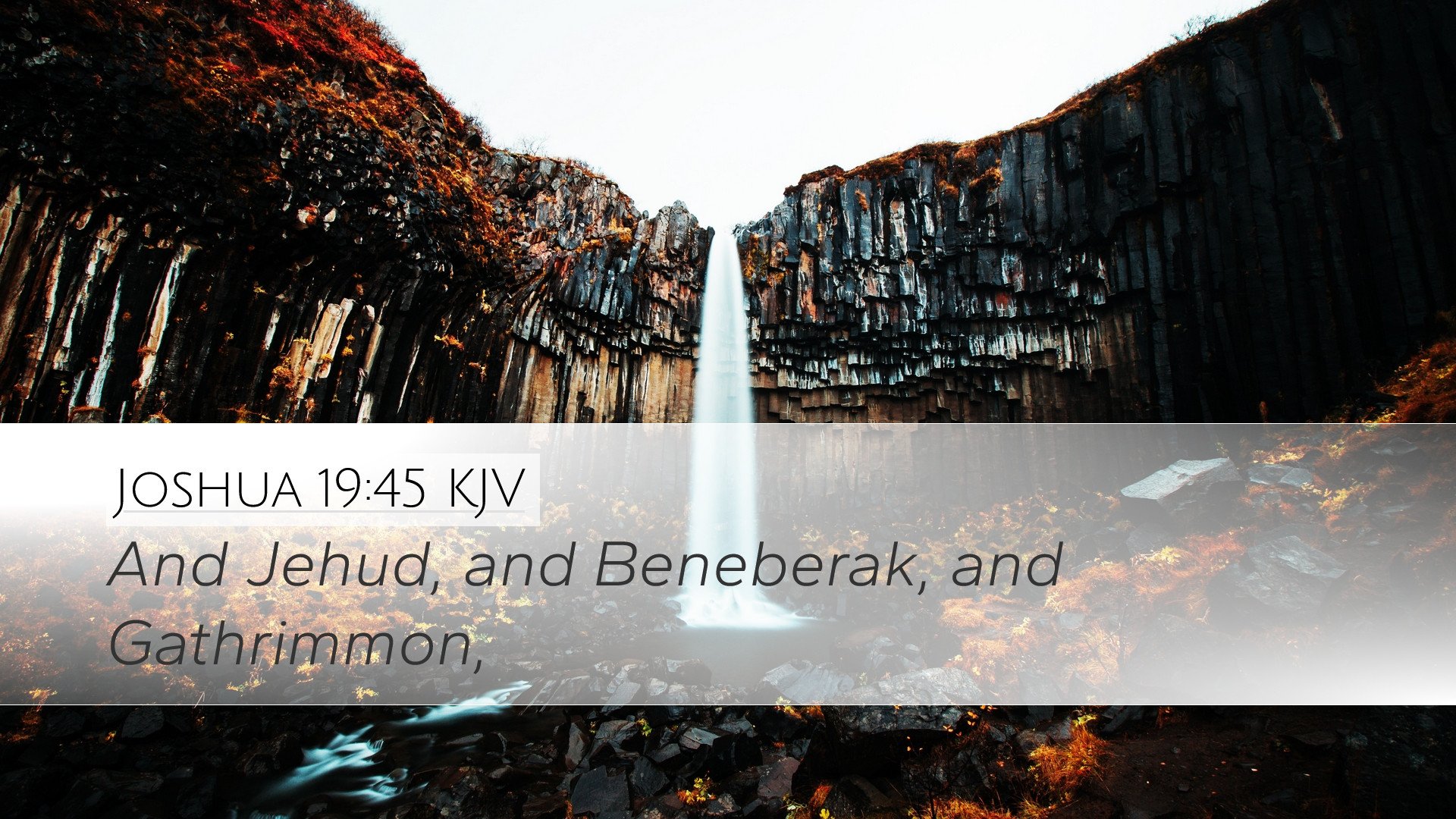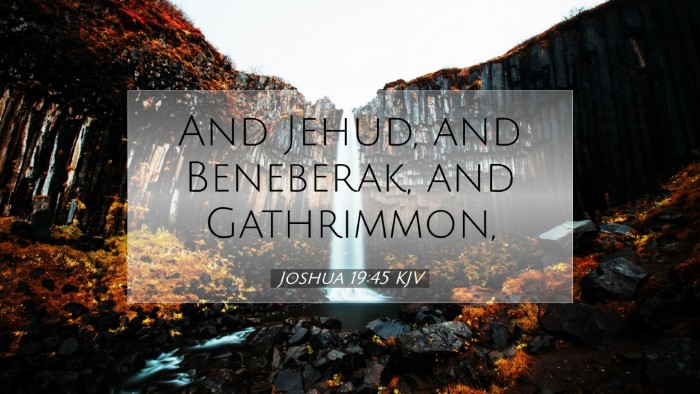Bible Commentary on Joshua 19:45
Joshua 19:45 states, "The towns of the tribe of the children of Dan were Zorah, and Eshtaol, and Irshemesh." This verse marks a specific allocation of inheritance to the tribe of Dan, contributing to the broader narrative of land distribution after the conquest of Canaan. To fully appreciate this verse, we must engage with its contextual, theological, and historical significance.
Contextual Overview
This verse appears within a larger section that describes the apportionment of land to the tribes of Israel (Joshua 13-21). After the Israelites conquered Canaan under Joshua’s leadership, each tribe received its designated territory. The tribe of Dan, being one of the smaller tribes, struggled to find an adequate allotment amid the other tribes, which adds weight to this reference.
The Significance of Towns
- Zorah: Recognized as a town of great importance, Zorah was noted for its strategic location and its connection to the life of Samson, one of the judges. This connection signifies the town's cultural and historical relevance.
- Eshtaol: Eshtaol served as a haven for the people and also appears in narratives concerning the establishment of the Philistines. Its mention here suggests a vibrant community and potential conflict zones.
- Irshemesh: The meaning of this name is debated, but it underscores the transitional society that flourished in this region. 'Irshemesh' might be interpreted as the City of the Sun, indicating a locale important for agriculture and worship.
Theological Insights
The allocation of cities to the tribe of Dan represents God’s faithfulness in fulfilling His promises to His people. Each town symbolizes a tangible inheritance, drawing attention to the covenant relationship established between God and Israel. As Matthew Henry notes, “the grants of divine favor are precisely suited to the just desires of the faithful.” This divine distribution represents both God’s provision and His sovereignty.
Challenges Faced by Dan
While the passage lists towns, it also alludes to the tensions inherent in the tribe of Dan’s inheritance. As Albert Barnes writes, “the tribe of Dan was unable to conquer their allotted territory due to the strength of the Philistines.” This highlights an essential theme: even in divine allocation and favor, challenges remain—both from within and outside the community.
Historical Context
Historically, these towns played crucial roles in the life of ancient Israel. The territory of Dan stretched from the Mediterranean Sea inland, bordering the lands of the Philistines. This geographic positioning created ongoing strife and necessitated a need for military strength and strategic alliances.
Symbol of Struggle and Opportunity
Additionally, Adam Clarke provides insight into Dan’s imperviousness to enemies through illicit means. He states, “The fate of Dan is indicative of the struggle between fidelity to God and reliance on one’s own strength.” This can be extrapolated to illustrate broader spiritual struggles faced by modern believers when confronting the challenges of faith and culture.
Contemporary Application
The legacy of Joshua 19:45 encourages contemporary readers to reflect on God's continual provision. Just as the towns served as a spiritual and cultural anchor for the tribe of Dan, the church today must claim and navigate its identity amid external pressures. It can serve as a reminder that inheritances are more than land; they encompass identity, community, and destiny.
The Significance of Community
For pastors and leaders, this text can lead to discussions about the importance of fostering strong communities within the church. Each member’s contribution should be acknowledged as pivotal to overcoming internal and external challenges. As Dan's cities were a refuge for its people, churches can be places of safety, worship, and growth.
Spiritual Warfare
Furthermore, recognizing the struggles of the tribe of Dan can invoke conversations about modern spiritual warfare. Barnelessly engaging in prayer and support among community members enables a stronger front against adversities similar to those faced by the Danites.
Conclusion
Joshua 19:45, while seemingly a simple enumeration of towns, unveils layers of meaning that resonate deeply within the Christian faith. It speaks to themes of inheritance, struggle, community, and divine faithfulness. Somber reminders of resourcefulness and reliance on God accentuate historical and contemporary applications. Leaders, students, and scholars alike can glean significant insights from this interaction of faith, identity, and purpose.


